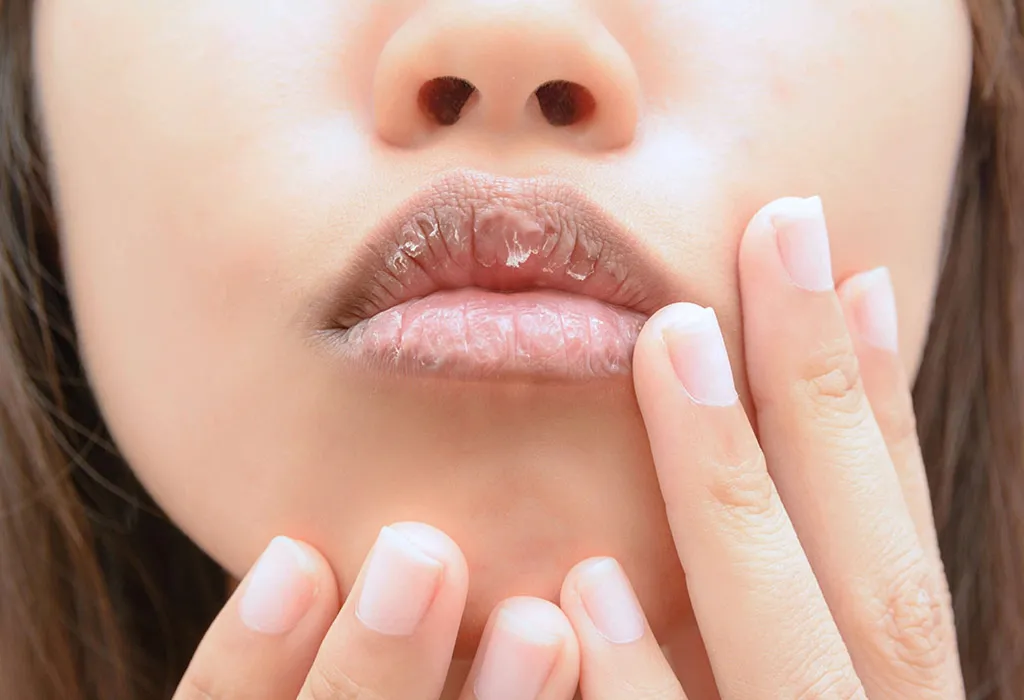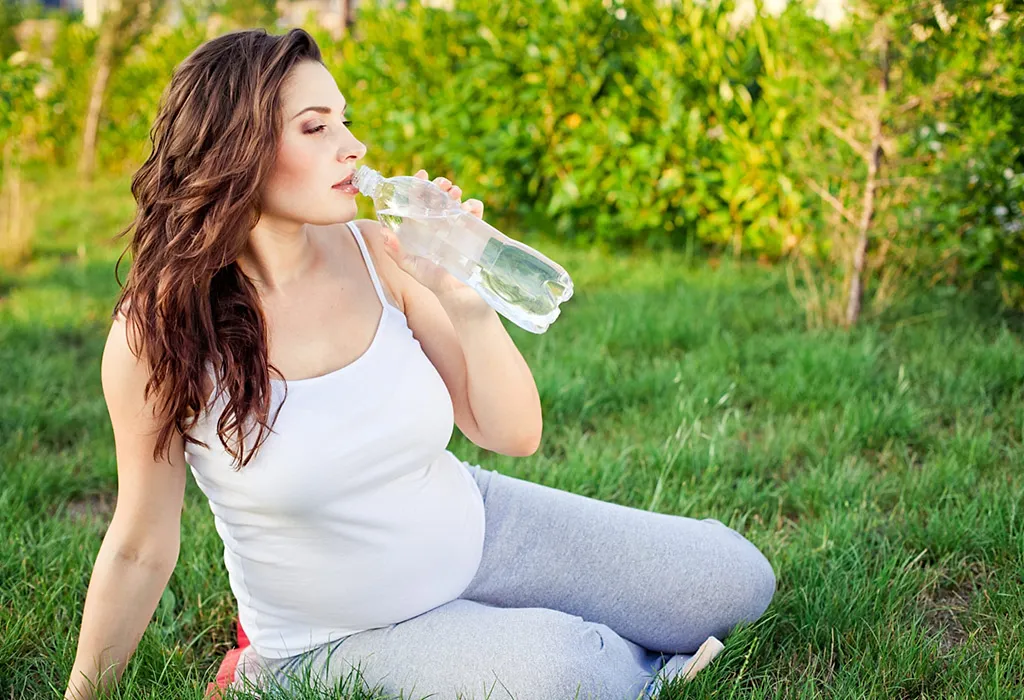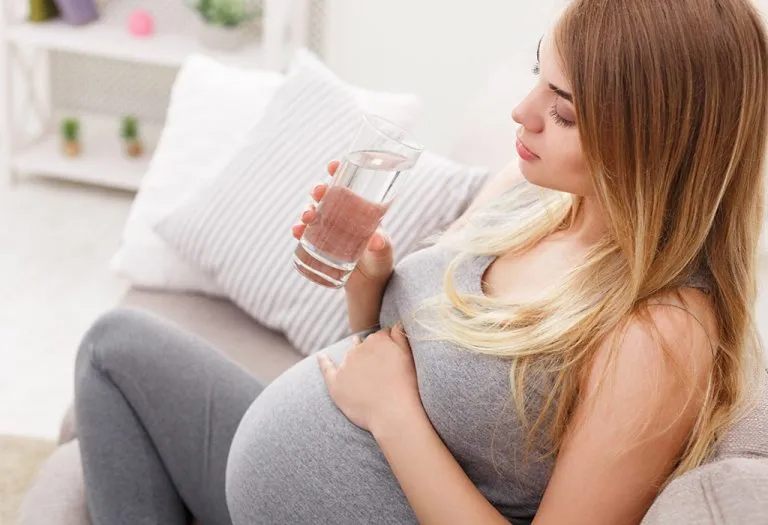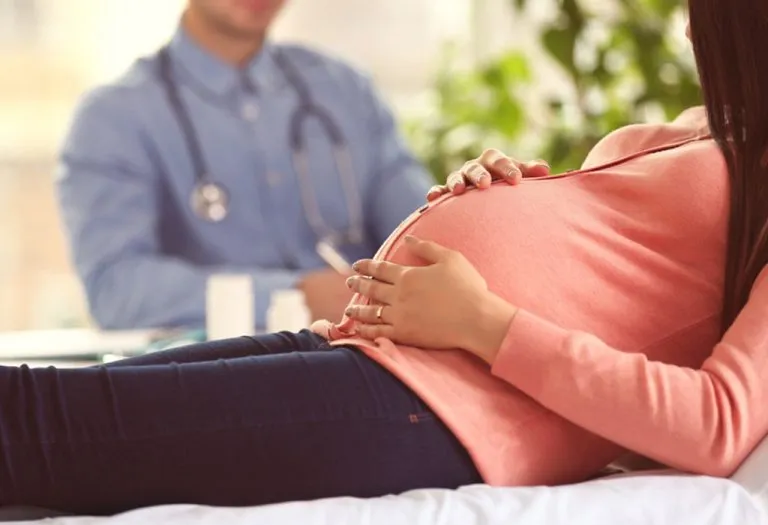Dehydration During Pregnancy: Signs, Reasons & Treatments

- What Is Dehydration?
- What Is the Importance of Staying Hydrated During Pregnancy?
- Causes of Dehydration During Pregnancy
- Signs and Symptoms of Dehydration in Pregnancy
- Risk of Dehydration During Pregnancy
- Complications of Dehydration When Pregnant
- Treatment for Dehydration During Pregnancy
- How Much Water Should a Pregnant Woman Drink?
- How Can Dehydration Be Prevented During Pregnancy?
- Best Foods and Drinks to Avoid Dehydration in Pregnancy
- When Should You Call the Doctor?
- FAQs
If you are pregnant, other than eating a whole range of healthy foods, you will have to drink enough water, too. Your doctor must have advised you to stay hydrated during pregnancy, and for good reasons, of course. Dehydration can be hard to detect, but it can cause several health problems during pregnancy. Yes, it can be problematic for anyone, but more so for pregnant women. Most cases of dehydration in pregnancy are mild, but severe cases can affect the health of both the mother and the baby. In this article, we talk about dehydration during pregnancy, its causes, and practical dehydration prevention tips. Let’s read about dehydration and pregnancy.
What Is Dehydration?
Dehydration happens when your body loses more water than it replenishes. So, if the water you drink does not replenish the lost fluids, you may become dehydrated (1). Dehydration can lead to other conditions like heat cramps, heat exhaustion, and stroke. It can even make your body struggle to perform normal functions. You will need more water during pregnancy as your body will make blood and fluids for your baby. Hence, staying hydrated is necessary.
What Is the Importance of Staying Hydrated During Pregnancy?
Maintaining adequate hydration is crucial during pregnancy for the healthy development of your baby. Water and fluids play a vital role in supporting various bodily functions, including digestion, regulating blood pressure, and delivering nutrients to your growing baby (2). Proper hydration also helps reduce the risk of complications like preterm labour and low amniotic fluid levels during delivery.
According to the American Pregnancy Association, dehydration in pregnancy can lead to health issues such as constipation, urinary tract infections, low amniotic fluid, low breast milk production, and even neural tube defects in the baby (3). Additionally, it can cause symptoms like fatigue, dizziness, and headaches, making it challenging to carry out daily activities. Therefore, it’s imperative to ensure you consume ample water and fluids throughout the day to maintain proper hydration levels.
According to a study published in the Journal of Nutritional Science in 2021, researchers found the effect of dehydration during pregnancy on the birth weight and length. the height, weight, and head and chest circumference of the babies from dehydrated mothers were lower than those in the normal, hydrated mother group (4).
Causes of Dehydration During Pregnancy
There are several reasons that could cause dehydration during pregnancy. Noticing the dehydration while pregnant due to these reasons is vital as you can then take the necessary measures to correct the same.
- Increased blood volume: The blood volume in a pregnant woman’s body increases by 50%. This is one of the main reasons for dehydration in early pregnancy. The body requires more water at this stage and will find it hard to retain water.
- Morning sickness: About 50% of pregnant women suffer from morning sickness, which includes nausea, vomiting, excessive urination, and sweating. All of these conditions result in the loss of water from the body. Morning sickness usually occurs in the first trimester and should ease up in the second trimester. Dehydration is also experienced because of frequent episodes of vomiting (5).
Did You Know?: Being overweight, experiencing multiple pregnancies, or being a first-time mother can elevate the risk of hyperemesis gravidarum, which is characterized by severe nausea and vomiting during pregnancy (6).
- Reduced intake of water: We all know that we should consume around eight glasses of water daily. But a pregnant woman needs to drink at least 8-12 glasses of water a day to stay hydrated. Hence, insufficient water intake could cause dehydration, resulting in reduced cognitive ability and a high risk of urinary system diseases (7).
- Excessive sweating: Sweating during pregnancy is common, but if the water is not replaced, it could cause dehydration.
- Diarrhoea: In the third trimester, you might find yourself suffering from bouts of diarrhoea. This is because of hormonal changes along with an aversion to certain foods that are important for maintaining your gut’s health. If you do not drink enough water during this time, you could become dehydrated.

- Weather: If you live in a hot or humid place, then your body will end up losing a lot of water. However, turning up the air conditioning might not be the answer. A room that is air-conditioned has very little moisture, which could cause you to lose moisture through your lungs.
- Age: One of the complications of pregnancy above the age of 35 is the inability of the body to retain water. If you are pregnant and in your mid or late 30s, you should drink more and more water to stay hydrated.
- Exercise: High-intensity exercises, especially during warmer weather, could result in dehydration in a pregnant person.
Signs and Symptoms of Dehydration in Pregnancy
Generally, the normal sign of dehydration is feeling thirsty. Maternal overheating can also be one of the prominent symptoms of dehydration; if you don’t drink enough water, your body may find it difficult to regulate heat, and you may become prone to overheating. But there are several other symptoms of dehydration that you must watch out for. Dehydration can range from mild to moderate to severe. Let’s have a look at the signs of dehydration in the first, second and third trimesters:
Mild Dehydration
- Feeling slightly thirst
- Feeling slightly anxious
- An increase in heart rate
- A decrease in the frequency of urination
Moderate Dehydration
- Severe thirst
- Tiredness
- A decrease in the frequency of urination
- Dark yellow urine
- Dizziness
- Headache
- Nausea
- Constipation
- Dry mouth
Severe Dehydration
- Extreme dehydration
- Dry mouth and chapped lips

- Low amounts of dark-coloured urine
- Nausea, vomiting, and headache
- Abdominal cramps
- Severe headache
- Exhaustion
- Fainting
- Confusion
- Increased heart rate
- Increased frequency of breaths
- Sunken eyes
- Prolonged skin recoil
- Low blood pressure
IMPORTANT: It’s crucial to note that maternal overheating can be an indication of dehydration. Therefore, ensuring you consume sufficient water is essential for regulating your body temperature during pregnancy.
If you notice any of these signs of dehydration in pregnancy, seek medical help immediately, as prolonged dehydration can be very harmful to your baby.
Risk of Dehydration During Pregnancy
Following are the risks associated with dehydration during pregnancy.
- Nausea
- Low amniotic fluid
- Low breast milk production
- Premature labour
Complications of Dehydration When Pregnant
Dehydration can affect a pregnant woman in different ways depending on how far along she is. The risks of dehydration in the three trimesters of pregnancy are explained below.
Effects of Dehydration During the First Trimester
- Severe nausea and dizziness: Morning sickness coupled with dehydration can become a vicious cycle. Dehydration may cause nausea, while morning sickness may cause dehydration. Breaking this cycle is important. Pregnant women will have to be given IV fluids for dehydration.
- Reduced amniotic fluid: The formation of amniotic fluid largely depends on the fluid intake of pregnant women in the initial months of their pregnancy. Low levels of water results in a reduced amount of amniotic fluids. This can result in the baby sticking to the uterine walls rather than floating in the fluid.
Effects of Dehydration During the Second and Third Trimesters
- Braxton-Hicks Contractions: Although not common, some women may experience Braxton-Hicks contractions due to dehydration (8).
- Premature labour: When a pregnant woman’s body is dehydrated, the volume of blood decreases. This causes the levels of the hormone oxytocin to increase. Oxytocin is directly responsible for the contractions of the uterus. A decrease in hydration is one of the causes of premature labour.
- Increase in muscle cramps: Dehydration will cause the body’s temperature to increase, which, in turn, causes your muscles to cramp. This condition can be extremely uncomfortable.
- Fatigue: Most pregnant women will experience some amount of fatigue. However, dehydration will make fatigue much worse.
- UTI: Dehydration in this stage could increase the chances of a urinary tract infection, which could cause complications in the kidney and result in early labour.
Treatment for Dehydration During Pregnancy
If you are experiencing mild to moderate dehydration during your pregnancy, then the best way to tackle it is by drinking more water. If your dehydration is caused by nausea and vomiting, talk to your doctor about getting medication for nausea. This will help you ingest more water and curb nausea, too. Check with your doctor if you can drink electrolyte supplements, as they can help balance your system. However, in the case of severe dehydration, you may have to visit the emergency room and be administered IV fluids for dehydration.
Caution: In cases where pregnant women continue to experience fluid loss and become dehydrated despite efforts to stay hydrated, hospitalization may be necessary to administer intravenous fluids. This ensures that they receive the necessary hydration and support for both their own well-being and the health of the developing baby.
How Much Water Should a Pregnant Woman Drink?
In order to decide how much water you should drink during pregnancy, you should check the colour of your urine. According to the Tommy’s, the urine should be either clear or light yellow (9). During pregnancy, if the colour of your urine is dark yellow or orange, you should have more water in the day. If you indulge in light activities, then a good rule of thumb is to have one cup of water for every hour of the activity. If you exercise regularly, you need to have more water to match the loss of water.
Many women don’t realise that they are thirsty. If you tend to forget to drink water and don’t feel thirsty often, you must keep a journal to note the time and amount of water consumed. This can be done via an app as well, as it will give you reminders on when and how much water to drink. So have a glass of water before and after a meal. This will not only help you remember to drink water but also help with any issues related to constipation.
How Can Dehydration Be Prevented During Pregnancy?
There are many ways in which you can ensure that you stay hydrated during pregnancy.
- Drink enough water and drink slowly (and at frequent intervals). Drinking too much water too fast can put too much pressure on your kidneys.
- Drink one cup of water for every hour that you are awake.
- You can add a couple of slices of lemon or a few pieces of watermelon to your glass of water for a different taste.
- Incorporate liquids into your diet. Soups and fresh fruit juices are great sources due to their water content. Make sure that the juice is made at home and that it is sugar-free.
- Do not consume caffeine, soda, or processed fruit juices with too much sugar. These substances act as diuretics, which is counterproductive.
- Avoid strenuous exercise and going out when it is hot. You will lose a large quantity of water and put unnecessary pressure on your body.
- Always have a water bottle with you, regardless of where you’re headed. This simple habit can help you stay consistently hydrated throughout the day, which is especially crucial during pregnancy.

Best Foods and Drinks to Avoid Dehydration in Pregnancy
While there’s a long list of reasons that could cause dehydration in pregnant women, it is actually very easy and practical to replenish your body with healthy fluids during pregnancy without much hassle. For starters, drinking 8-12 glasses of drinking water a day is recommended for expecting women. To stay hydrated, you can have any of the following drinks and keep your taste buds happy:
- Milk
- Fresh, homemade fruit juice
- Soup
- Watermelon
- Cucumber
- Strawberries
- Celery
When Should You Call the Doctor?
Dehydration can cause alarming symptoms. You must immediately rush to the emergency room if your pulse is weak or have a spell of fainting. Apart from these, having a rapid heartbeat along with bloody stools also warrants a visit to the doctor. If you haven’t urinated for more than eight hours, you must contact your doctor.
FAQs
Read on for answers to some of the most frequently asked questions about dehydration during pregnancy.
1. How can dehydration cause premature birth of the baby?
Since dehydration decreases the volume of the blood, the level of the hormone oxytocin will increase. This hormone is responsible for, among other things, the contraction of the uterine walls. If dehydration hits in the later months of pregnancy, the contractions could be strong enough to send you into premature labour.
2. Does dehydration cause cramps in early pregnancy?
Dehydration will cause the temperature of your body to increase. When this happens, your muscles may begin to cramp. Dehydration can occur during any stage of your pregnancy. It is imperative that you stay hydrated by drinking enough water and eating fresh fruits on a regular basis.
3. Is it possible to have a miscarriage if I am dehydrated?
Although severe dehydration in a pregnant woman could potentially lead to a miscarriage scare, fetal death is not a direct result of dehydration but a risk factor (10).
4. Can dehydration cause a decrease in fetal movement?
Not drinking enough water during the first, second and third trimester can lead to a reduction in amniotic fluid levels, a condition known as oligohydramnios. Although many individuals with oligohydramnios may not experience obvious symptoms, some might observe a decrease in fetal movement.
Dehydration is a condition that can catch you unawares. So, keep track of the amount of water you drink as well as the colour of your urine. Use apps or set reminders to drink your daily recommended amount of water. Remember, you are now drinking water not just for yourself but also for the child growing in you. So stay hydrated and consult a doctor if you face any complications during this time.
References/Resources:
2. CHI Saint Joseph Health – Dehydration During Pregnancy: What Expecting Mothers Should Know
3. American Pregnancy Association – Dehydration During Pregnancy
4. PubMed Central – Effect of dehydration during pregnancy on birth weight and length in West Jakarta
5. BMJ – Management of nausea and vomiting in pregnancy
6. Cleveland Clinic – Hyperemesis Gravidarum
8. American Pregnancy Association – Braxton Hicks Contractions – Causes, Symptoms & Pain Relief
9. Tommy’s – How much water should I drink in pregnancy?
10. PubMed Central – Factors Related to Fetal Death in Pregnant Women with Cholera, Haiti, 2011–2014
Also Read:
Excessive Thirst while Pregnant
Coconut Water during Pregnancy
Drinking Hot Water when Pregnant
Drinking Sparkling Water in Pregnancy
Was This Article Helpful?
Parenting is a huge responsibility, for you as a caregiver, but also for us as a parenting content platform. We understand that and take our responsibility of creating credible content seriously. FirstCry Parenting articles are written and published only after extensive research using factually sound references to deliver quality content that is accurate, validated by experts, and completely reliable. To understand how we go about creating content that is credible, read our editorial policy here.




































